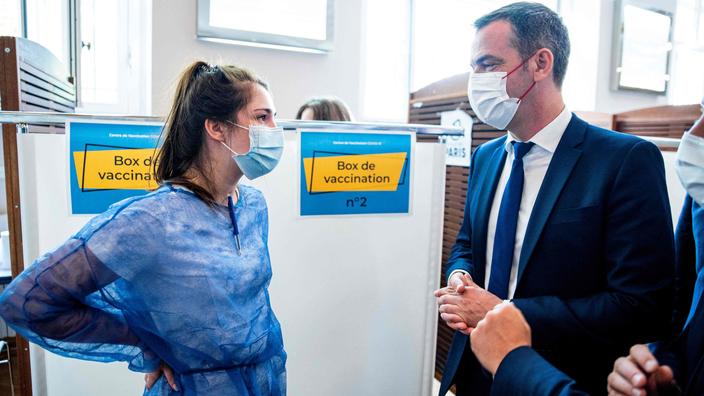The executive is maneuvering to avoid seeing the number of vaccination appointments decrease.
As summer approaches, concerns are emerging about the desire of some French people to postpone their vaccination until the start of the school year, for fear of having to interrupt their holidays to receive their second dose - the general rule that both doses are received at the same location.
Read also: 30 million first-time vaccinated against Covid-19: what are the next steps?
To counteract this phenomenon, the Ministry of Health announced on Tuesday that the flexibility of the interval between two doses of messenger RNA vaccines - Pfizer or Moderna - will be "
further extended
". Currently, a second dose of one of these vaccines should be received between 35 and 49 days after the first. A duration that had already been extended a few weeks ago. It will be reviewed again, and will soon be set between 21 and 49 days, ie the “
widest possible
”
gap
.
For the ministry, this development should make it possible to convince French people to receive their first dose shortly and to receive the second before they leave on vacation. "
If we do not allow flexibility on the gap, there is a risk of slowing down access to primary injection for people
" fearing that they will have to upset their vacations, insists the ministry.
Despite the acceleration, the vaccination campaign still has a long way to go. 82% of people over 70 received a first dose, and 65% received two. The proportion of first injected passes to 79% for those over 60, to 75% for those over 50 and to 58% for all adults. The ministry "
does not set a ceiling
" on the rate of people vaccinated by age group: "
the objective is to go as far as possible
", one indicates. Also, only two out of three people with comorbidities received a first injection, says the ministry. There is also significant room for improvement.
The executive closely observes the vaccination adherence surveys, and keeps their conclusions as a "
beacon
": if 90% of an age group say, in the surveys, wanting to receive a first dose, this figure can be seen as the bottom level to be reached.
The government thus intends "to
allow people who, theoretically, want to be vaccinated
", to receive their dose.
Tens of millions of doses received during the summer
If the dose delivery schedule has not yet been definitively fixed for the coming months, the Ministry of the Economy has nonetheless provided some details. France received 12.5 million doses in April and 15.5 million in May. 23 million doses are expected in June, July and "
at least as many
" in August. That is more than 65 million doses over the summer.
In addition, France will have given, at the end of June, "
more than 1.5 million AstraZeneca
" to the international Covax initiative. In the longer term, the government wants to "
significantly and very quickly increase the number of doses given to Covax
", by integrating the other vaccines - J&J, Pfizer and Moderna - "
before the end of the summer
". As a reminder, Emmanuel Macron said Sunday evening that France would give 60 million doses to poor countries by the end of the year.
In France, the campaign is continuing at an accelerated pace, with around 4 million injections performed per week.
The opening of vaccination to minors causes a "
fairly strong enthusiasm
", according to the Ministry of Health.
Information observed in the first figures communicated this Tuesday morning by the Doctolib slot reservation platform.
Janssen "did
not find his audience
"
Obstacles and unknowns remain, however, hampering the smooth running of the campaign. First, Janssen has "
not found its audience
": with a rate of use of only 22%, this vaccine remains little used in France, a situation "
really unfortunate
", which the ministry regrets. By way of comparison, the utilization rate reached, Sunday evening, 89% for Pfizer, 83% for Moderna and 61% for AstraZeneca. The current "
lack of mobilization
" on Janssen is coupled with a drop in the rate of flow of doses, observed last week. What frankly alert the executive.
Moderna, for its part, is not yet sufficiently used in the city: the general population is not sufficiently aware that it can receive this vaccine from doctors, pharmacists, midwives and nurses, deplores the ministry.
In the coming months, the government intends to strengthen its arsenal, first by integrating Pfizer into city medicine, alongside Moderna, as soon as “
the start of the school year
”.
In addition, "
work which will be completed very soon
" should allow doctors to have a list of their unvaccinated patients, in order to strengthen the mechanisms to go towards making it possible to widely offer doses.
"
This requires a legal change, which will be made quickly,
" says one.
For the start of the school year, the executive is also working on "
complementary devices
" to strengthen the vaccination of adolescents. Mobile teams, reserved beaches in vaccination centers ... "
Everything is open
", and studied in conjunction with the Ministry of Education, we note.

